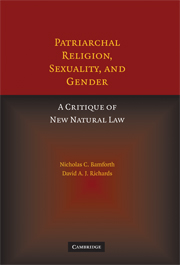Book contents
- Frontmatter
- Contents
- Acknowledgments
- 1 New Natural Law in Context
- 2 Criteria for Evaluating New Natural Law
- 3 The Architecture and Reach of New Natural Law
- 4 Internal Consistency (1): Is New Natural Law Secular?
- 5 Internal Consistency (2): New Natural Law and Thomas Aquinas
- 6 Substantive Appeal (1): What's Wrong with Homophobia and Sexism?
- 7 Substantive Appeal (2): New Natural Law, Sexism, and Homophobia
- 8 Moral Absolutes and the Possible Fundamentalism of New Natural Law
- 9 New Natural Law and Patriarchal Religion
- 10 Concluding Observasions, and Christian Alternatives to New Natural Law
- Bibliography
- Index
6 - Substantive Appeal (1): What's Wrong with Homophobia and Sexism?
Published online by Cambridge University Press: 14 August 2009
- Frontmatter
- Contents
- Acknowledgments
- 1 New Natural Law in Context
- 2 Criteria for Evaluating New Natural Law
- 3 The Architecture and Reach of New Natural Law
- 4 Internal Consistency (1): Is New Natural Law Secular?
- 5 Internal Consistency (2): New Natural Law and Thomas Aquinas
- 6 Substantive Appeal (1): What's Wrong with Homophobia and Sexism?
- 7 Substantive Appeal (2): New Natural Law, Sexism, and Homophobia
- 8 Moral Absolutes and the Possible Fundamentalism of New Natural Law
- 9 New Natural Law and Patriarchal Religion
- 10 Concluding Observasions, and Christian Alternatives to New Natural Law
- Bibliography
- Index
Summary
Our inquiry into the substantive appeal of the new natural lawyers' views concerning gender and sexuality needs to proceed in three stages. First, in the present chapter we explore some of the key arguments that have been advanced – both philosophically and in constitutional litigation – to explain the moral and constitutional wrongs associated with discrimination relating to gender and sexual orientation, and in the broader social attitudes known as sexism and homophobia. We consider arguments based on respect for privacy, equality, and autonomy (with its concomitant opposition to what we describe as moral slavery). We argue that autonomy constitutes the strongest argument of the three, and that it may indeed be treated as the value underpinning arguments based upon privacy and equality. Although these three arguments reach radically different conclusions from those advanced by the new natural lawyers, the exercise is analogous to that engaged in by Finnis and George when they (respectively) advocated a conservative interpretation of relevant U.S. constitutional provisions in Romer v. Evans and Lawrence v. Texas, in that we accept – as they do – that judges do and should take account of philosophical arguments when determining the proper scope of such provisions. We thus set out, as a possible constitutional principle giving voice to the autonomy argument in the U.S. context, the theory of opposition to moral slavery (advanced by one of us in previous writings).
- Type
- Chapter
- Information
- Patriarchal Religion, Sexuality, and GenderA Critique of New Natural Law, pp. 190 - 227Publisher: Cambridge University PressPrint publication year: 2007



